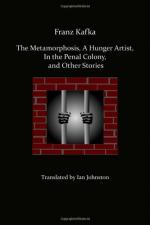|
This section contains 736 words (approx. 3 pages at 300 words per page) |

|
SOURCE: "Cannibalism and Starvation: The Parameters of Eating Disorders in Literature," in Disorderly Eaters: Texts in Self-Empowerment, edited by Lilian R. Furst and Peter W. Graham, The Pennsylvania State University Press, 1992, pp. 11-27.
In the following excerpt, Medeiros asserts that Kafka's hunger artist exhibits the same characteristics as actual anorexics.
[Kafka's Hunger Artist,] in his voluntary denial of any form of consumption . . . approximates the actual behavior of anorexics. Kafka's story, like most of his writing, hinges on a paradox and the resulting aporia—in this case, the confession made by the Hunger Artist, just before he expires, that he never ate "because [he] could not find the food that [he] liked." This crucial statement both questions the entire foundation for the nameless artist's existence—his capacity and wish to withstand hunger indefinitely—and negates his claim to artistic talent, because he appears to relegate all his actions to...
|
This section contains 736 words (approx. 3 pages at 300 words per page) |

|


